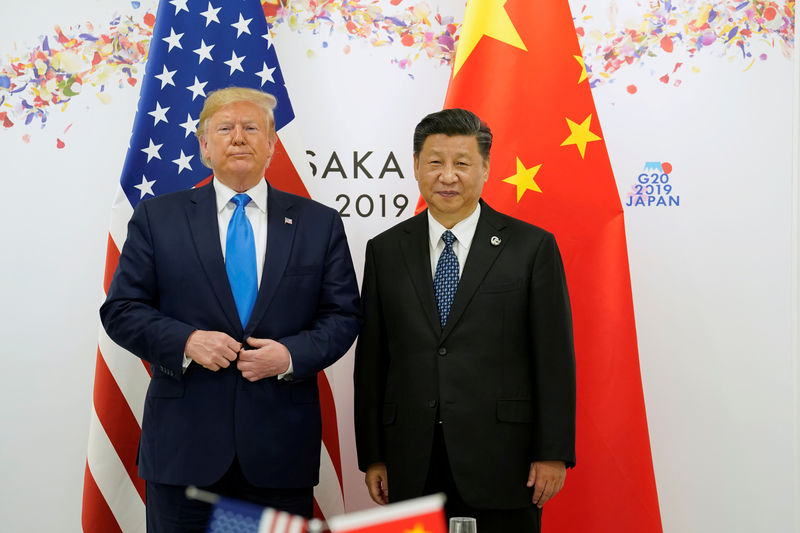By Steve Holland
WASHINGTON (Reuters) - An interim trade agreement between the United States and China might not be completed in time for signing in Chile next month as expected but that does not mean the accord is falling apart, a U.S. administration official said on Tuesday.
U.S. and Chinese negotiators are working to complete a text for the agreements for U.S. President Donald Trump and Chinese President Xi Jinping to sign at an Asia-Pacific Economic Cooperation summit in Chile Nov. 16-17.
"If it's not signed in Chile, that doesn't mean that it falls apart. It just means that it's not ready," the administration official said. "Our goal is to sign it in Chile. But sometimes texts aren't ready. But good progress is being made and we expect to sign the agreement in Chile."
Trump, Treasury Secretary Steven Mnuchin and other top U.S. officials have all said good progress is being made on the deal after a nearly 16-month trade war, while also noting that it would be fine if the deal was not finalized by the APEC summit.
White House spokesman Judd Deere said both sides were still working to complete work on the interim deal.
"As the president said several weeks ago, we have reached a phase-one agreement with the Chinese and both sides are working to finalize the text for a signing in Chile," he said.
U.S. stocks turned negative after Reuters reported the administration official's comments, as investors bet the closely watched trade talks were further away from resolution.
The interim trade agreement announced by Trump on Oct. 11 had buoyed markets, promising relief for companies rocked by nearly 16 months of tit-for-tat tariffs that have slowed global growth to its slowest pace since the 2008-2009 financial crisis.
The South China Morning Post, citing a person briefed on the arrangements, reported early Tuesday that the leaders of the world's two largest economies were tentatively slated to sign the interim trade deal on Nov. 17 "if everything goes smoothly."
A U.S.-based source confirmed that was the target date for a meeting, but the administration official cautioned that the text might not be completed in time.
White House adviser Jared Kushner, Trump's son-in-law, told a panel at the Future Investment Initiative conference in Riyadh that U.S. Trade Representative Robert Lighthizer and Mnuchin "have made a fabulous deal" with Beijing.
"I think people understand the president, that he's firm. They know that he's going to make the decisions that he thinks are right, and I think ultimately that we've come to an understanding with China now on where we want to head," he said.
Lighthizer said on Friday that Washington and Beijing are "close to finalizing" some sections of a trade agreement after a phone call between top negotiators.
U.S. officials have said the deal is to cover Chinese purchases of U.S. agricultural goods, intellectual property protections, currency practices and increased access for U.S. companies to China's financial services market.
Jude Blanchette, a fellow at the Center for Strategic and International Studies, said the phase one deal was restoring the status quo to where it stood before the trade war began in 2017, calling into question how much progress had actually been made.
Tougher issues - such as China's industrial policy, subsidies for state-owned enterprises, forced technology transfers - had been deferred for negotiation later, he said.

"The can has been kicked down to a phase two or phase three, but we're really just wondering if we're going to get through phase one," he said.